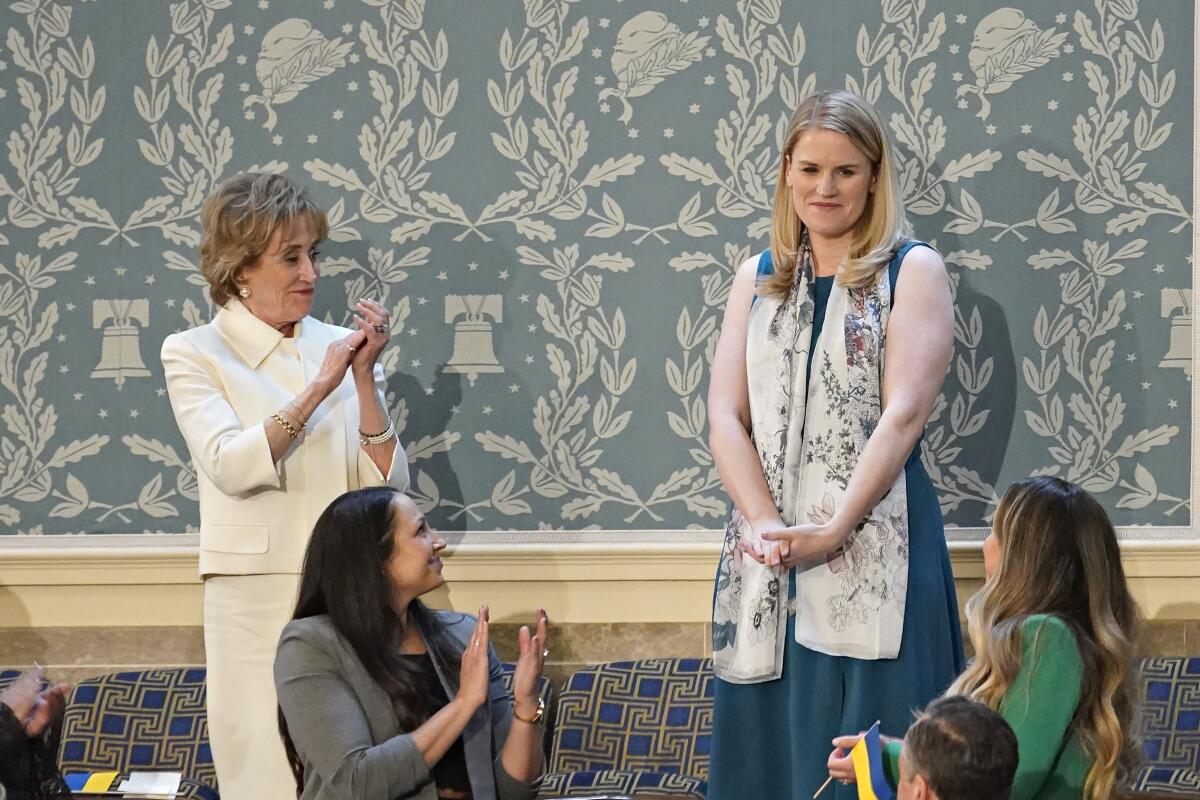Facebook whistleblower works to pass new internet laws

- Share via
Frances Haugen was cooking dinner one Friday evening when her phone rang. On the other end of the line was the White House.
Could Haugen get to Washington in four days, Deputy Chief of Staff Bruce Reed asked. She’d been chosen to be the first lady’s guest at the forthcoming State of the Union.
“It actually was mildly disruptive,” recalls Haugen, who lives in Puerto Rico. “But, you know — the kind of disruption you don’t mind.”
It was only in October, during a “60 Minutes” interview, that Haugen first publicly identified herself as the whistleblower responsible for leaking thousands of pages of internal Facebook documents to Congress, the Wall Street Journal and the Securities and Exchange Commission.
Those disclosures — which were subsequently made available to many other news outlets, including The Times — turned the former Facebook product manager into the face of long-brewing backlash against Facebook, its sister app Instagram and the social media industry writ large. By publicizing files demonstrating that Facebook (which has since changed its name to Meta Platforms) had been internally aware of a wide variety of problems with its products, including the effect they can have on teen mental health, Haugen offered critics of the company something that looked a lot like a smoking gun.
The transition to public figure was an unlikely one for Haugen. “I don’t crave attention,” she told The Times. “I eloped the first time I got married. I’ve had two birthday parties in, like, 20 years.”
But now, her profile boosted by a presidential shout-out in the State of the Union speech, Haugen is making the most of her new soapbox. That means throwing her weight behind efforts to solve the same problems she helped expose, including in California.
Central to her efforts is a bill creeping its way through the state Assembly. Dubbed the California Age-Appropriate Design Code Act, it would require web platforms that children are likely to use to put in place data privacy measures such as making user settings high-privacy by default, describing privacy policies in language kids can understand and prohibiting children’s personal information from being used for anything other than the purpose for which it was initially collected.
“I don’t want to take too much credit for [the bill] because I did not play a hand in drafting it,” Haugen said. “But I am a strong supporter that we need to be beginning to extend the same standards that we have for physical toys for children to the virtual space because right now there are some pretty insane consequences that are happening because these products aren’t designed for children.”
Facebook has long emphasized the strength of its efforts to contain misinformation targeted at Latinos and Spanish speakers. A whistleblower’s leaks show employees raising alarms about the problem.
Haugen did a question-and-answer session for state lawmakers in Sacramento a few weeks ago — “I’m very willing to help answer questions for anyone who wants to understand more about what the impacts [of] algorithms are” — and also spoke at the Mom 2.0 summit, a Los Angeles gathering for parenting-focused influencers in late April.
That Haugen is largely focused on how social media affect their youngest users is no accident. Although her disclosures cast light on a wide variety of internet issues — disinformation, radicalization and human trafficking — it’s been the content about children and teens that seems to have most moved lawmakers.
In particular, internal Facebook research that Haugen helped make public showed that nearly a third of teenage girls the company had surveyed said that “when they felt bad about their bodies, Instagram made them feel worse.” Facebook had historically downplayed its mental health effect on young users, the Wall Street Journal reported at the time.
The head of a Senate panel examining social media’s negative effects on young people dismissed as a public relations tactic some safety measures announced by Facebook’s popular Instagram platform
The company has maintained post-leak that its research was misrepresented, but the reveal nevertheless sparked congressional hearings and, although the Age-Appropriate Design Code Act was developed independently of Haugen, heightened the stakes of the California bill.
“Frances has brought tremendous public awareness to this cause, especially on the issue of kids,” Assemblymember Buffy Wicks (D-Oakland), who authored the Design Code Act, said in an emailed statement. “I’m grateful that she came to Sacramento last month to speak to lawmakers and advocates, and that she continues to lend her voice and expertise to explaining why policies like the code are needed to keep kids safe online.”
Facebook did not respond to a request for comment.
Haugen said she’s not surprised that this part of her leaks has drawn so much interest.
“The solutions to a lot of the problems outlined in my disclosures are actually quite complicated,” she said. “When it comes to kids, it’s really simple.”
The effect of social media on kids has become such a hot-button issue that a second bill with a similar focus is also now moving through the Assembly: the Social Media Platform Duty to Children Act, which would let parents sue social media companies for designing addictive software. Haugen said she wasn’t aware of the bill, but co-sponsor Jordan Cunningham (R-Paso Robles) told The Times in March that her leaks were a catalyst for it. (A representative for Cunningham said that the assemblyman hasn’t worked or spoken with Haugen directly. Wicks, the Oakland Democrat, is also a co-sponsor of the Duty to Children Act.)
Figuring prominently in Haugen’s advocacy has been Common Sense Media, a nonprofit that analyzes the effect media and technology have on young people, and Jim Steyer, its founder and chief executive. Common Sense Media asked Haugen if she’d help it support the Age-Appropriate Design Code Act, the whistleblower said, and she said yes.
“Frances has turned out to be an excellent partner for us because she … does a great job of explaining how the tech platforms work, some of the harms involved and why we need major legislation and regulation,” said Steyer, the brother of 2020 presidential candidate and hedge fund billionaire Tom Steyer.
His organization has been working with Haugen for about five months, Steyer said, after her legal team approached it about collaborating: “We started planning ways in which we could work on federal legislation, as well as California legislation, and also on mobilizing young people.” (Wicks used to work at Common Sense Media.)
The organization also worked with the White House to get Haugen to the State of the Union, Steyer said.
Haugen’s sway extends beyond the West Coast. She estimates that she’s spent about five and a half weeks in Europe working to support a landmark European Union law — the Digital Services Act — that would compel social media platforms, including Facebook, to more aggressively moderate hate speech, disinformation and other user-generated content, as well as ban online ads targeting children. Both the European Parliament and the member states of the European Union have agreed on the contents of the DSA, although it’s still subject to formal approval.
“Up until the DSA passing, that was kind of the main focus, doing support around gaining awareness,” Haugen said. She was on the ground “supporting legislators, doing testimony, meeting with various ministries [and] meeting with other civil society groups,” and also wrote a New York Times opinion piece in support of the law.
She’s also gotten involved with environmental, social and governance, or ESG, efforts aimed at helping investors “have criteria for how to evaluate whether or not social media companies are acting in a prosocial way,” she said, and is working on founding a nonprofit that will combine that work with support for litigation as well as education efforts geared toward teaching people about social media. Steyer said that his organization has been helping Haugen “incubate” her nonprofit.
It’s a meteoric rise for someone who, less than a year ago, had no national profile.
“When I disclosed the documents to the SEC and Congress, I had no expectations on what was going to happen,” Haugen said. “My primary goal was I didn’t want to carry the burden for the rest of my life that I had known something and I had done nothing.”
But despite all that’s happened since she stepped into the public eye — White House phone calls, European excursions, rubbing shoulders with California’s political heavyweights — Haugen said the main difference she’s experienced over the last few months has been the weight that’s been lifted from her shoulders.
“The biggest thing that’s changed in my life,” she said, “is I can sleep at night.”









